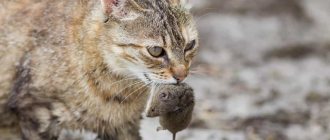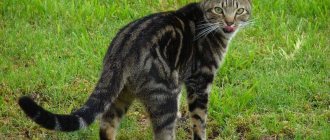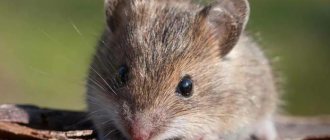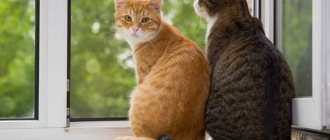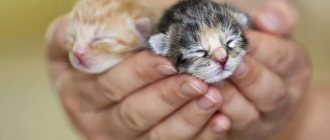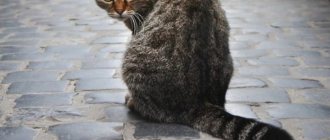Satisfying the hunting instinct
Even the cutest and fluffiest kitten once played the role of a hunter and predator in nature. After people domesticated cats and began using them as pets, they no longer needed to hunt for food. However, instinct periodically takes over and requires its manifestation in domesticated conditions.
Read also: Why is it so difficult to quit smoking?
Even if a cat’s body does not lack any elements to maintain health, hunting for mice is its natural need, a reflex that cannot be restrained. Catching mice is not just the job of barn cats. Many purebred kittens living in greenhouse conditions, once they see a mouse, will definitely chase it. But whether they eat their prey for lunch or not depends on whether they are tormented by hunger.
Tips for choosing a ratcatcher cat
- First of all, you need to consider that the rat is a major pest. Only an animal of the appropriate build can cope with it. You should not expect that a small, fragile cat like the Singapura, weighing only 3-4 kilograms, will risk taking your side in this dispute. A ratcatcher cat should have a strong, stocky body and powerful jaws. Body size should depend on muscles, and not on fat - a plump cat only looks impressive, but in reality it is unlikely to bite a mouse.
- Most often, the ability to fight rats is demonstrated by the “weaker sex” – cats, not cats, contrary to popular belief. There is an opinion that this is due to the protection of offspring, because rats are very dangerous for a small kitten. Be that as it may, in nine cases out of ten, the purr with the gray pest in his teeth is Murka, not Vasily.
- If we talk about the breed of the future assistant, those called aboriginal or natural are suitable. Such breeds have evolved over centuries without human intervention, often descended from wild ancestors and inherited hunting instincts. These include, for example, the Siberian cat, the European shorthair, and the Siamese. However, the most effective are considered to be yard, outbred purrs - for the reason that they have to fight for life, and the strongest and most skillful individuals survive. Of course, you shouldn’t expect that any fluffy dog on the street is an excellent rat catcher. Most often, homeless wanderers are former domestic cats, kicked out by careless owners.
- To avoid mistakes and almost certainly get a rat-catcher cat, you should look for a kitten born to a rat-catcher mother. Firstly, since the mother cat has suitable data for such work, then they will certainly be passed on to the children. Secondly, hunting plays a big role in raising kittens, and the cat will definitely teach them the wisdom of fighting rats. Of course, the information that this cat catches rats must be verified. And of course, there is no need to rush to take kittens away from their mother before they have yet learned this complex art.
Remember that if your pet is bitten by a rat, you need to immediately help him, it is best to contact a veterinarian. To protect your cat from possible infections, you should get all the necessary vaccinations in advance, and be sure to treat the wounds.
Author of the article: Alena Oleynikova, artist and cat lover, especially for Kota Obormot
Is it possible to stop eating mice?
Modern cats (with the exception of those who sit on pasture) have stopped eating caught mice: they are brought to their owners as proof of their dexterity and diligence, often in gratitude for human care. In addition, a cat will not eat a mouse if it has had enough to eat. If you don’t want your pet to eat rodents, watch the energy value of its usual food.
There is an option - to put on a collar with tiny bells: this way, the cat will not only not eat, but, above all, will not catch the mouse . A side effect is the annoying rattling of the bell, which not everyone can withstand. If your cat starts chasing mice at your dacha, build her an enclosure where she can frolic until the evening: in this case, all the day’s prey will remain in the enclosure, and you will take the cat into the house in the evening. This method is also not flawless - most personal plots are not designed for unplanned structures.
This is interesting! The most ingenious development is considered to be the development of one meticulous programmer, who came up with a compact automatic door for his cat named Squirrel. The guy got tired of bumping into cat trophies (strangled mice/birds in different corners of the apartment) and he designed a door that opened in front of the “empty” cat and did not open if he was holding something in his teeth.
The programmer taught the camera standing at the entrance to analyze the image (which was simultaneously broadcast to the web server), comparing it with a template, and make a decision about allowing the object into the house.
It will also be interesting:
Which breeds are better at catching mice?
Cats that do not belong to a specific breed are the best at catching mice. The effectiveness of hunting by such individuals is explained by their lifestyle and the need to independently obtain food. And although their “professionalism” is incomparable with the hunting skills of purebred cats, among the latter there are also recognized rat catchers.
These include indigenous varieties, the formation of which occurred under natural conditions:
- American Shorthair. Representatives of this cat breed have a rich history and were previously used to catch rodents in food warehouses and stores.
- Burmese cat. This intelligent and charming animal loves to eat and is a master at catching mice.
- British Shorthair. The compact cat with a plush coat is also considered a good hunter. She not only catches mice, but often brings them to their owners.
- European cat. Similar animals were common in Ancient Rome. They prefer to hunt at night and are considered excellent rat catchers.
- Cymric. These powerful, short-tailed cats with sharp claws are designed to be kept in open areas and have innate hunting skills.
- Kurilian Bobtail. The bobtail cat has long hind legs, due to which it can develop high speed and jump long distances. The Kurilian Bobtail is capable of not only catching a mouse, but also driving away strange dogs that have sneaked into the area.
- Maine Coon. A powerful cat with well-developed muscles and strong hunting instincts, it is suitable for keeping in a private home with free access to the outdoors. The Maine Coon reacts with lightning speed to rodents and leaves them no chance.
- Manx. These cats have always been popular among farmers and sailors. They have developed hunting instincts and are skilled at catching mice.
- Nibelung. Rare long-haired cats with a complex, freedom-loving character are endowed with developed hunting instincts and are known as excellent rat catchers.
- Russian blue. The small cat has lightning-fast reactions and can move silently. She is able to catch the slightest rustle and immediately rushes in pursuit of prey.
- Siberian. A fast cat with excellent reactions is considered an unrivaled hunter. The shaggy Siberian prefers to live in wide open spaces and can pursue prey in any weather.
American shorthair cat
Burmese cat
Cymric cat
Kurilian Bobtail
Siamese, Abyssinian, Bengal, Burmese and Persian cats are good at catching mice. All of them were formed in natural conditions with minimal human intervention and do an excellent job of fighting rodents.
The fun process of catching rodents
This cute, fluffy, affectionate creature is a natural enemy of field mice, house mice, and rats. Pests cannot even stand the smell of cats; they avoid their property and fear for their lives.
In cats, the huntress instinct is genetically embedded. Even when well-fed, she will not miss the moment to chase a mouse that suddenly appears. The process itself gives pleasure - to catch, not to miss. But whether to kill, eat or not depends on other factors.
A study was conducted in the USA. They crossed purebred cats and yard cats with one cat. The kittens were swapped after they were born. Purebred cats were raised by yard cats. As a result, it turned out that everyone had developed hunting skills. Mothers regularly brought small rodents to their kittens. But further actions were different. The yard worker killed in cold blood, showed how it should be done to the kittens, and gave them to them to eat. The thoroughbred was limited to playing. The conclusion followed was that in order for kittens to start catching mice and eating them, an example is needed. Instinct alone is not enough; skills are also required.
The main signs of a mousecatcher cat
In order for a kitten to become a good rat catcher in the future, it must be taken from a mother who has well-developed hunting instincts. And so that she has time to pass on her skills to her offspring, it is recommended to pick up the baby no earlier than 4 months.
On a note. If a kitten is adopted from a stray mother, there is a high probability that it will grow into an excellent mouser. In purebred animals, the hunting instincts are dulled, especially if several generations of his ancestors were housed.
You can also determine which kittens will catch mice in the future by their appearance. It is believed that a good hunter should have the following characteristics:
- A triangular head with powerful jaws, long mustaches and high-set ears topped with tassels.
- Camouflage color. It is believed that cats with tortoiseshell, pied, grey, red, black, tabby or spotted coats have an easier time remaining undetected.
- Short hair. A thick, long coat interferes with hunting and, when wet, acquires a characteristic odor that repels mice and rats.
- Well-built body with strong bones, well-developed muscles and large paws.
Why do cats bring you a dead mouse?
Have you ever woken up in your clean bed in the morning, and were horrified to find a dead mouse in it and a cat next to you breaking into a contented smile? Or maybe it happened in the kitchen or some other secluded place? Why do cats bring their prey into the house and leave it in the most unexpected places? There may be several reasons for this pet behavior:
Read also: Why VPN stopped working in Opera
- The cat shares its prey with you;
- The cat wants to leave the mouse “for later”;
- For the purpose of reinsurance, so that the prey is not taken away by other predators.
Don't scold your four-legged friend. After all, he brought his lawful prey to his home from the bottom of his heart. Carefully take the mouse to a separate place outside the house and tell your pet to bring its victims here from now on.
To summarize, I would like to add the following. A real hunter, most often the one who was raised from childhood in suitable conditions. The best cats to play the role of Sherlock Holmes are cats that are smooth-haired, gray (black, red), striped and with long mustaches. But above all, do not forget that your cat must be vaccinated according to the vaccination schedule. Several times a year, she should also be dewormed and fleas should be poisoned.
What is a cat for?
If you have mice or rats in your home, the best way to get rid of them is to buy mousetraps. But some owners of summer cottages do not find much pleasure in removing the bloody corpses of rodents from these structures. And various poisoned baits that mice eat will become a huge problem due to the fact that the poisoned mouse will die somewhere under the floor, and the unpleasant smell of a decomposing body will begin to spread throughout the house. In order to avoid all these troubles, you need to take home a cat or kitten that can be taught to hunt rodents.
Instincts or fun
Yard kittens, forced to fight for existence, hunt mice like adults from the age of 5 months. In the USA, they conducted an experiment in which they established a connection between the living conditions of kittens and their hunting reflexes, first by mating purebred and street cats with one cat. The litters, after they were born, were swapped - the purebreds were given to the yard mothers and vice versa.
As a result, it turned out that initial hunting skills were inherent in both groups, since mothers regularly carried mice to their litters. The difference appeared at the next stage: the street cat killed rodents and gave them to kittens, while the purebred cat only played with the mouse.
Important! The researchers concluded that to consolidate the reflex of catching/eating living creatures, instinct alone is not enough, but skills acquired through education are necessary.
On the other hand, a kitten growing up isolated from its fellow cats independently learns the basic wisdom of a cat (washes itself, sharpens its claws, snorts, relieves itself, meows pitifully or angrily) and is quite capable of catching a mouse. Another question is whether he will eat it or not. If a kitten is very hungry, it is unlikely that the lack of a mother's example will stop him.
Can a domestic cat catch rats?
Sometimes people wonder: how good are cats at catching rats? Are they all capable of this? Some people are interested simply out of curiosity, others are thinking about getting a rat-catcher cat. The Murkoshi team is ready to give answers to these questions, talking about how and under what conditions a cat can become a rat hunter, and whether it is really necessary to send your pet to this dangerous activity.
1) Cats, rats and people: a history of relationships
2) The importance of hunting in the life of cats
3) How a mother cat teaches kittens to hunt
4) So how good are modern house cats at hunting rats?
5) What should a good rat catcher be like?
6) Is rat hunting safe?
7) What can replace hunting?
Cats, rats and people: a history of relationships
Of all rodents, rats cause the greatest harm to people. They eat and destroy crops and food supplies in warehouses and barns, gnaw things, and most importantly, they can spread infectious diseases through bites. Thus, in the United States, about 14 thousand people suffer from rat bites every year. In Moscow, 102 people were bitten by rodents in 2021.
And this is now, when a person has various means of deratization in his arsenal. What can we say about the dawn of civilization, thousands of years ago, when humanity had just switched to agriculture, it began to store grain reserves in barns, and rats flocked to them, threatening to doom entire settlements to starvation. Who knows, perhaps no civilization would have arisen if cats had not followed the rodents and literally saved man. Therefore, it is not surprising that in warm countries (primarily in the Middle East, where civilization arose), where the issue of pests is especially acute (and the fight against snakes, which cats also hunted, is also relevant), at all times there has been a special attitude towards cats, somewhere even sacred.
But in medieval Europe, cats were underestimated, they were considered accomplices of witches and the devil and sources of all kinds of misfortune. Alas, furry purrs were often destroyed. For this, the Europeans paid a high price - rats bred en masse on the continent, which brought the plague with them. Epidemics took up to a third of the population with them.
Read more about the history of cat domestication: https://www.murkosha.ru/nashi-stati/interesnoe-o-koshkakh/koshka-kotoraya-do-sikh-por-gulyaet-sama-po-sebe-istoriya-odomashnivaniya-koshek
The importance of hunting in the life of cats
Over the centuries and millennia, people have changed a lot. Cats, albeit to a lesser extent, have changed too. Nowadays there is no need for pets to hunt; the most useful qualities for survival turned out to be those that are pleasant to humans - contact, affection, and complaisance. But hunting instincts still lie dormant in every pet.
Cats are predators by nature, and hunting is firmly ingrained in their genes. Therefore, you should not be surprised when you see a cat hunting a mouse, a bird, a frog, or a rustling candy wrapper.
Some cats are still excellent hunters, in no way inferior to their wild ancestors. All kittens are taught basic hunting skills by their mother cat.
How a mother cat teaches her kittens to hunt
About five weeks after birth, the mother cat begins teaching her kittens how to hunt. Before this, the kids play among themselves, “fight.” For them, the game, first of all, is preparation for the hunt.
Initially, the mother cat catches the mouse, kills it, brings it to the kittens and eats it before their eyes. Then she brings mice to the kittens, giving them the opportunity to eat themselves. And finally, when the kittens reach the age of 2.5 - 3 months, the cat brings the mouse while still alive, allowing the kittens to kill it themselves.
Usually the cat watches from the side as they cope with the task. If the prey manages to escape, the mother cat catches it again and returns it to the kittens, giving them another try. Kittens have a well-developed attack instinct, but it is often not justified. If the mother sees that the kittens’ actions are ineffective, then she shows by her own example how to do it.
The interest in killing a mouse on your own for the first time is stimulated, first of all, by the atmosphere of cheerful competition that reigns among kittens of the same litter.
Of course, there is no talk of any rat hunting at this age. The mother cat simply will not let the kittens near the rat (as well as the rat near the kittens), unless she brings a little rat. Still, an adult rat can be dangerous even for a small and/or pampered cat, let alone a kitten. For comparison: if a mouse weighs on average 30 g, then an adult rat weighs on average 330 g, and some individuals are much larger.
Although the cat still helps to hone hunting techniques, including large rodents. So at 8-12 months the kitten can try its hand against a rat.
So how good are modern house cats at hunting rats?
There is no clear answer to this question. Many “hereditary” domestic cats (born in apartments, raised by a mother who was also a domestic cat all her life, etc.) may never even see a living mouse, and not in the first generation. Naturally, the hunting skill becomes dull. A running rodent will still attract the cat's attention, but it is unlikely that an untrained pet will seriously get involved with a rat.
An adult, seasoned rat, unlike a mouse, is able to fend for itself. When faced with a cat, an experienced rat stands up on its hind legs (so it appears larger) and... begins to chase the cat. It’s not for nothing that they say that the best defense is an attack. An inexperienced domestic cat, not expecting such behavior from the victim, gets lost and runs away. Only a pet with a very lively nature can not be afraid of such a daring counterattack. In this case, the rat gets lost and runs away. But even in this case, an inexperienced hunter can, at best, injure the rat, but in the end it will still run away.
To catch such a dangerous rodent, you need skills, physical abilities and motivation. An insufficiently motivated cat will most likely choose not to get involved.
What should a good rat catcher be like?
The rat-catcher cat must have a strong, stocky body, and must have powerful jaws (they will be needed for gripping and a strong bite, which will immobilize the victim). A long mustache is also required. It’s not for nothing that a kitten used to be chosen based on its rich whiskers - it’s both beautiful and, most importantly, useful. After all, with the help of its whiskers, a cat detects the slightest vibrations in the air, estimates the distance to the target and orients itself in the dark. Extremely fine hearing is also very important.
The rat-catcher cat must quickly notice the prey, rush sharply, simultaneously strike with both paws and immediately grab the scruff of the neck with its teeth. Only in this case the adult rat does not stand a chance.
By the way, as statistics show, in 9 cases out of 10 it is cats who catch rats, not cats. There is an opinion that this is due to the protection of offspring, because rats are very dangerous for a small kitten.
Here the answer, alas, is clear - no, it is not safe. In this case, the cat faces two dangers at once. The first is due to the fact that this pest can fight back and injure it, infecting it with various viruses, including those that are 100% likely to lead to death (such as rabies). Rats are the main carriers of rabies, so it is deadly dangerous for an unvaccinated cat to hunt them. In any case, your pet needs to be vaccinated on time, even if he does not leave the house - to eliminate the slightest possibility.
Read more about the importance of vaccinations: https://www.murkosha.ru/nashi-stati/lechenie-i-profilaktika/privivki-u-koshek-chto-kak-zachem
The second danger is that rats, especially in the city, are often poisoned. If the cat does catch a rat and eats it, it may be poisoned. Therefore, “Murkosha” categorically objects to self-walking of cats - on the street, in addition to this danger, there are many other dangers for pets.
Read more about the dangers of self-walking: What is cat self-walking and why is it dangerous?
Moreover, this is also true for dachas and rural areas. You can walk your cat only in the local area and only on a harness under the supervision of the owner. Cats do not need to go out on their own and hunt, especially dangerous prey like rats. As for protecting the house from these pests, the very presence of a cat in the apartment will provide it. Yes, a cat can be afraid of a rat, but rats are much more afraid of cats. Rodents prefer to avoid places where there are cats.
You may ask: what about hunting? After all, we started the article with the fact that it is incredibly important for cats. Now we recommend depriving her of pets. Won't this affect their well-being, activity and, ultimately, their health?
Not if hunting is replaced by play. For a cat, play is hunting, and a toy is prey. The kitten, playing with its mother cat and other kittens, learns to hunt in the process. So it is not surprising that play can replace hunting for adult cats. Therefore, if you play with a cat at least 2-3 times a day for 10-15 minutes (with a kitten, of course, you need to do it more often), this will provide him with the necessary level of activity.
Read more about playing with a cat: Why do cats play and how to do it correctly with them?
You can easily verify this by visiting the Murkosha shelter. Even when in a confined space, cats strive to play, often trying to attract guests to this. Games with employees, volunteers and guests help them live a rich and interesting life, and remain cheerful and active even in their advanced years.
Reasons for eating rodents
When asked why cats eat mice, the answer always arises - because of hunger. The situation when a skinny cat sees a dead rodent and is in no hurry to touch it has dispelled this myth. Then why does the cat eat the mouse?
Nature has established an inextricable connection between cats and rodents. Mouse skin contains many useful trace elements, especially sulfur. They are necessary for the full development of the cat’s body and good health. Sulfur is a component of cystine and mythionine. The components are responsible for the health, beautiful coat, and mood of the cat. Meat should be included in the daily diet. In its absence, pets begin to get their own food.
Indoor cats will not chew mice, since their supply of sulfur comes with vitamins, which the owner constantly supplies them with. There is no feeling of hunger and access to food is unlimited. Therefore, you can see a cat eating a mouse on the street among the yard “residents”.
Can a cat eat mice and birds?
QUESTION
I have an indoor cat that comes out for walks in our private yard. There are mice in our yard. The cat, in addition to the meat I give her, also periodically eats mice. Sometimes it eats birds. I want to know if she can be allowed to do this? Is it dangerous for a cat to eat mice and birds?
MURKOTIKA SITE RESPONSE
Mice are a typical food for cats, and their carcasses contain many useful elements. Even the skin has many benefits. Because mouse is a natural food, this means that you cannot feed a cat that eats mice with factory food, i.e. and the rest of the time you need to feed him natural food, and raw meat. Mixed nutrition in this case can be dangerous. In cats on raw meat, the acidity of the stomach is sufficient to process mice with their bones, skin, and even neutralize some infections and parasites. In drying cats, the environment in the stomach shifts to the alkaline side, that is, the acidity is not enough to neutralize infections and even digest raw meat. That is, if a cat is constantly on a natural raw food diet, then its stomach will digest mice well.
Potential Hazards
Is it safe for a cat to indulge in hunting? Not as much as you would like.
Rats, often the prey of cats, are carriers of diseases such as rabies and distemper; they can also be intermediate hosts of fleas and ticks, which are often carriers of piroplasmosis and encephalitis. Birds often carry subcutaneous mites and fungal infections. In addition, street animals can “give” worms to your pet. In cities, rodents are periodically poisoned with rat poison, which, when it enters the cat’s body, kills it.
Owners have phobias of rodents and birds. Phobias should not be confused with fears. The former make a person lose control of himself and cause many unpleasant emotions and problems. If the owner has such deviations, the cat that brought a “gift” into the house may be given to someone else or even thrown out into the street.
There are, of course, indirect dangers. On the street, a cat can be hit by a car, chewed by a dog or another cat, or a pet can run into evil people. The latter is especially true if the cat decides to plunder someone’s chicken coop.
Does a cat eat mice?
If a pet's diet is balanced, and it receives the substances necessary for the normal functioning of the body with food, then it is unlikely that it will eat rodents. A normal healthy cat will not refuse to catch mice, but hunting will turn into entertainment for him. Many fanciers are faced with a situation where a cat brings prey into the house, displays it in a visible place, bragging about its achievements to the owner. Another option is also possible: the animal hides, say, rats with their heads chewed off, in a secluded corner, under the carpet. An unpleasant smell, coming from nowhere, makes it possible to detect a “storeroom”, and this is a problem that needs to be solved.
Disadvantages of eating rodents
Mouse Hunt
Can a cat eat mice? It sounds strange. These are two components of one chain. Cats should eat rodents in the wild, live indoors, but be outdoors frequently. In modern conditions, there are several risks from which pets should be protected.
- Cats should not be allowed to eat mice if there is a risk of poisoning. If neighbors use poison to control rodents, the cat receives a dose of mouse poison.
- The hunter should regularly receive medications against helminths, fleas, and ticks. Rodents are the main distributors of parasites. The pet must be protected.
- All routine vaccinations are required. Mice spread many terrible diseases. Some of them are transmitted to humans through pets after contact with a mouse.
A cat brings prey into the house for several reasons - to brag about its achievement to its owners, to “feed” them, to hide them from barn cats, to eat them later, as a reserve for a rainy day.
Cats eat mice, but not all of them. This requires not only hunting instincts, but also certain living conditions. Yard kittens are capable of conducting the most brutal hunt for rodents already at 5 months of age.
( 2 ratings, average 5 out of 5 )
Main breeds of rat catchers
Independent hunters are representatives of the Russian Blue breed. They become attached to only one owner, whom they are ready to protect from rodents. Athletic athletes - Chartreux cats - have a beautiful athletic physique, which helps in catching rats and mice.
Maine Coon
This ratcatcher cat is the largest breed; it is an intelligent and selective animal - a good hunter. The Maine Coon reacts with lightning speed to a rodent, and its powerful body and dexterous movements leave no chance for rats and mice. At the same time, he is a sweet and gentle creature who will purr with pleasure in his owner’s ear.
Siberian
The Siberian cat rarely becomes attached to humans, perhaps it has the “wild” blood of its ancestors. This balanced and powerful animal is considered the best rat hunter. Freedom is very important for an obstinate pet; the cat wants to walk outside from time to time. The Siberian cat is capable of developing great speed in running and jumping well. In addition, the animal has an excellent reaction.
European
The cat was common in ancient Rome. She copes well with the duties of a rat catcher. Each representative of this breed is an individual. The animal has a silver marbled or gray color.
Kurilian Bobtail
The animal was brought to us from the Kuril Islands. By their nature, the fluffies of this breed are similar to dogs. The little kitten quickly becomes attached to its owner and tries to take care of him.
Cats can not only deal with a rat, but also drive away a small dog that has entered their territory.
The Kurilian Bobtail has a small tail. The cat has elongated and powerful hind limbs, which allow him to jump and develop great speed while running. The Bobtail can cope with any rat's home.
Siamese
Humans have nothing to do with the breeding of this breed. Siamese cats are fast and graceful. They have a very well developed hunting instinct.
Why do cats catch mice?
A pet's hunting for rodents is genetically programmed. For the sake of this skill, man tamed the cat. In apartment conditions, in new buildings and on floors above the 2nd, it is almost impossible to see a cat eating a mouse. This is a common occurrence in a country house or rural home. Cats eat mice and hunt to provide themselves with the amino acid taurine, which is not synthesized by the body. Sometimes owners notice that animals only eat the head of the rodent, but do not like to eat the body and throw it away. Instinct tells the cat that the brains of mice and rats contain a high concentration of the necessary substance. More often than not, the cat eats the mouse with its skin. This means that in addition to taurine, your pet also needs sulfur, which is found in abundance in the rodent’s coat.
How to get rid of mice and rats? 8 breeds of rat-catching cats that will find and neutralize rodents
For most of us, cats are the embodiment of home comfort, tranquility and laziness. Few people would think that these charming couch potatoes can bring tangible benefits. And yet it is so. Today we will talk about rat-catching cats that can clean the house and surrounding area from mice and rats
Despite the fact that all cats are predators, not everyone can become a good rat catcher. The rodent hunter must have strong bones, well-developed muscles, long, dexterous paws and (optional) striped or tri-colored coloring that will provide good camouflage.
Gender matters too. Ratcatching cats are very rare; cats usually hunt rodents. They are driven by maternal instinct, or more precisely, by the need to feed and protect their offspring.
If a cat actively catches mice and rats, she will teach her cubs to do the same. Therefore, they should not be separated from their mother earlier than 4-5 months after birth.
Since domestic cats have been living with humans for hundreds of years, they have no urgent need to get their own food. Therefore, in many ornamental varieties, hunting instincts have been lost. On the other hand, there are many breeds that were and remain excellent predators and in which the hunter gene is highly developed.
European shorthair cat
Small smooth-haired animals of gray striped, spotted or marbled color are considered to be outbred. But these “plebeians” caught rats and mice back in Ancient Rome. The European Shorthair cat is a strong, agile and intelligent animal. She loves and knows how to hunt, and at the same time has good contact with people. However, if you pick up a mongrel kitten on the street, you shouldn’t hope that it will start exterminating rats left and right. As a rule, private breeders or nurseries are engaged in breeding really high-quality rat-catcher cats, and often there is a queue for offspring almost a year in advance. If you want such a cat, look for trusted breeders with recommendations, but remember that it takes 4-5 months for a mother to teach her cub predator skills, so you should give preference to older kittens.
Ratcatcher cats can catch rats, mice, snakes and moles equally well, but they will also calmly deal with domestic animals - ducklings or chickens. Therefore, it is important to raise the animal correctly from the very beginning.
Siamese cat
Another hunting breed with a long history. The first mentions of blue-eyed beauties date back to the 13th century. They come from the kingdom of Siam. Smooth-haired, lean animals are distinguished by excellent reactions and the ability to show aggression when necessary. Siamese get along well with people, but have a rather independent disposition. Their small size does not allow these cats to hunt rats effectively, but they do an excellent job with mice. The instinct is transmitted at the genetic level and strengthened in kittens by their mother.
The rat is a fairly large rodent, and therefore the hunter should not be small. It is necessary that she has well-developed muscles, skeleton and jaws, and a stable psyche. If she hides or runs away from any loud sound, the cat will no longer be able to become a good rat catcher.
Maine Coon
These luxurious, large (weighing up to 15 kg) cats come from America, more precisely the state of Maine. They were specially bred to exterminate mice and rats on farms and ships. Despite their impressive size, Maine Coons are agile and agile. Large ears provide them with excellent hearing, and strong paws provide them with a good grip.
Thick, long hair allows the Maine Coon to live in harsh climates. But it also creates problems for the owners. The fact is that these cats need to be brushed regularly. If you leave the animal to its own devices, the magnificent fur will quickly become tangled and no longer protect against the cold.
The disadvantages of Maine Coons include gluttony (which should not be surprising, given their size) and independent character. These natural hunters are not particularly interested in constant human contact. They shy away from petting that they consider inappropriate, and if the owner is too intrusive, they can get angry and bite.
Ratcatcher cats need regular, long walks to stay in good physical shape.
Russian blue cat
This is a real aristocrat among rat catchers. Russian blue cats were kept at court by many royals, for example, Peter I and Catherine II. Centuries later, these graceful, smooth-haired animals remain excellent hunters. They can handle not only mice, but also rats weighing up to 0.5 kg!
It is worth noting that Russian Blue cats do not get along well with representatives of other breeds, but get along well with their own. Like many other predators, they are not particularly susceptible to affection, but at the same time they treat people with sympathy and rarely show aggression.
Please note - a lazy, barely mobile cat cannot become a good rat catcher.
Kurilian Bobtail
Bobtails are quite large animals, capable of rivaling Maine Coons in size. The weight of a cat can reach 10 kg, and that of a cat - 6 kg. The homeland of this breed is the Kuril Islands. Difficult living conditions raised them to be brave and strong hunters. They have a short tail and strong legs, providing excellent jumping ability. Bobtails cope with both mice and large rats.
Among other breeds, the bobtail is distinguished by its sociability and easy-going character. They readily make contact with humans, are easy to train and get along well with other animals, including large dogs. This makes them similar to another “tailless” cat - the Manx cat
, which also has a friendly disposition combined with excellent hunting skills.
Kurilian Bobtail
Manx cat
Cymric
These are medium-sized cats, also without a tail. They have long, tenacious legs that allow them to catch up with prey and grab it with a death grip. They have a strong skeleton with athletically developed muscles. Cymrics are sociable and active, and it is very important for them to spend a lot of time outdoors. It is not worth keeping such a mobile animal in an apartment - during games it will destroy everything around. Experienced breeders recommend keeping these cats in country houses.
Siberian cat
Siberian cat
This breed appeared in Siberia several centuries ago. Harsh winters forced these large cats, weighing up to 9 kg, to grow thick, long hair and learn to get enough food for themselves to survive. The Siberian cat is an excellent hunter, killing both mice and rats. She easily and quickly overtakes her prey, and her long claws do not allow her to escape. Cats are patient and can stalk their prey for hours, waiting for the best moment. The animal loves to spend time outdoors, so it is better in the house than in the apartment. It is not aggressive, but it treats people rather indifferently. Siberian is a cat that walks on its own.
British shorthair cat
British cats combine developed hunting instincts, friendliness and calmness. The weight of the animal rarely exceeds 4 kg, so it is difficult for it to fight with a rat. But the British do an excellent job with mice. And they often bring them home as a gift to the owner. You shouldn’t be angry about this, because this is how the cat shows care. From her point of view, a person is a helpless creature, unable to provide food for himself.
Of course, choosing a kitten from this list does not mean that an excellent rat catcher will appear in the house. Heredity is of great importance. Let's repeat - if a mother cat is a good hunter, most likely her kittens will be the same. A clue as to whether a kitten will catch mice and rats can be its behavior. If during play he grabs the “prey” with his teeth, and not just grabs it with his paws, most likely he has a tendency to hunt.
You need to play active games with the growing animal, let it go for walks around the area as often as possible and reward it for every prey, even if it is not a mouse or rat, but an insect. At the same time, it is impossible to starve an animal by pushing it to obtain food on its own. The cat will look for food, scouring garbage dumps, or even leave altogether in search of a better life. You need to feed the rat catcher 4-6 times a day, in small portions.
It is extremely important to regularly give your cat all necessary vaccinations, and first of all - against rabies. After all, during a hunt, a pet can pick up a dangerous infection from a rodent. And of course, if traces of scratches or bites are found on your pet’s body, you should immediately contact a veterinarian
Gender question
Cat or cat? Which one is the best hunter? If you need to choose an animal to catch rodents based on gender, then the answer is obvious - it’s a cat. By nature, she must obtain food for her cubs. And cats are looking for someone to conceive. Although if they are castrated, they begin to hunt more productively.
Experts do not recommend keeping two cats on a farm at once without castration. They will be constantly busy dividing the territory. Hunting will not bother them.
A cat that has undergone sterilization is much more effective at catching mice in the yard and in the house. But there is a minus here - she is deprived of the opportunity to bear children, that is, new generations of hunters.
Who is better at catching mice, a cat or a cat?
According to experts, cats are the best rodent hunters. Unlike cats, they catch mice and rats without being distracted by such secondary factors as the instinct of reproduction and the protection of personal boundaries.
The hunting instinct is most pronounced in domestic females before the onset of estrus and during the period of feeding offspring. In addition, it is cats who teach growing kittens how to hunt, while simultaneously honing their own skills.
Important! Cats perceive all birds and small rodents as potential prey, without dividing them into friends and foes. Therefore, if in addition to mustachioed predators in the house there are hamsters, parrots and other living creatures, it must be protected from cat claws.
How to wean it off?
An ordinary yard cat, as centuries-old practice shows, is protected by high immunity, and dies more often from accidents or from old age than from a mouse infection. Let him hunt for himself, because that’s why he’s kept on the farm. Another situation is when the cat is purebred, even luxury, and participates in exhibitions. Such animals must be strictly protected from contact with rodents. The best way to achieve this is to feed it properly, then the pet simply will not feel the need to hunt. If the instinct cannot be overcome, then you can hang a small bell on the collar. The sound will scare away rodents, and the cat simply will not be able to catch them. There are also exclusive ways to protect your pet from hunting, for example, using electronic devices.
Why does a cat eat mice?
Owners of mouse-cats notice that the latter do not always eat the whole mouse, often being content with its head. The explanation is simple - in the brain of rodents there is a lot of taurine, which enters the cat's body during meals. By the way, mass ailments among domestic cats began after the appearance of the first batches of factory-made food in Europe and the USA, when cats stopped catching mice, as they were forcibly transferred to ready-made diets.
Important! The trio of sulfonic acids (cysteine, cystine and methionine), which support cat health, are also responsible for the quantity/quality of fur, stimulating its growth. It is possible that the cat also realizes the benefits of mouse skin, saturated with the original element, sulfur, which is why it eats the mouse completely and along with the fur.
After some time, the cats began to get sick more, lose their eyesight and suffer from heart disease. After a series of studies, it turned out that the body of cats (unlike dogs) is not able to synthesize taurine from protein foods. Taurine is not for nothing called a sulfonic acid or sulfur-containing amino acid - it is not formed in the body without cysteine (another sulfur-containing amino acid).
Cats vs rats
It is believed that yard cats are better at hunting rats.
Not every cat will dare to fight these strong gray creatures. A seasoned, old rat itself can be the size of a small cat; it is a serious opponent. Therefore, rat catchers from the cat tribe deserve special respect - risking their lives, they engage in real battles with pests. Such a cat will always have many old scars from previous battles.
The problem is that there is no specific breed of cat that is dedicated to catching rats. In this regard, getting a pet that would bring relief from toothache is not so easy.
There are often recommendations for raising a rat catcher from an ordinary domestic cat - as a rule, they boil down to the advice “don’t feed it, then it will start catching prey.” Unfortunately, this advice is no good:
- A cat would rather start eating in garbage dumps or begging for food from neighbors than fight a rat without having the slightest experience in this matter.
- Trying to starve to raise a predator in your pet, you risk simply losing the cat.
What effective recommendations can be given to a person who needs a rat-catcher cat?

